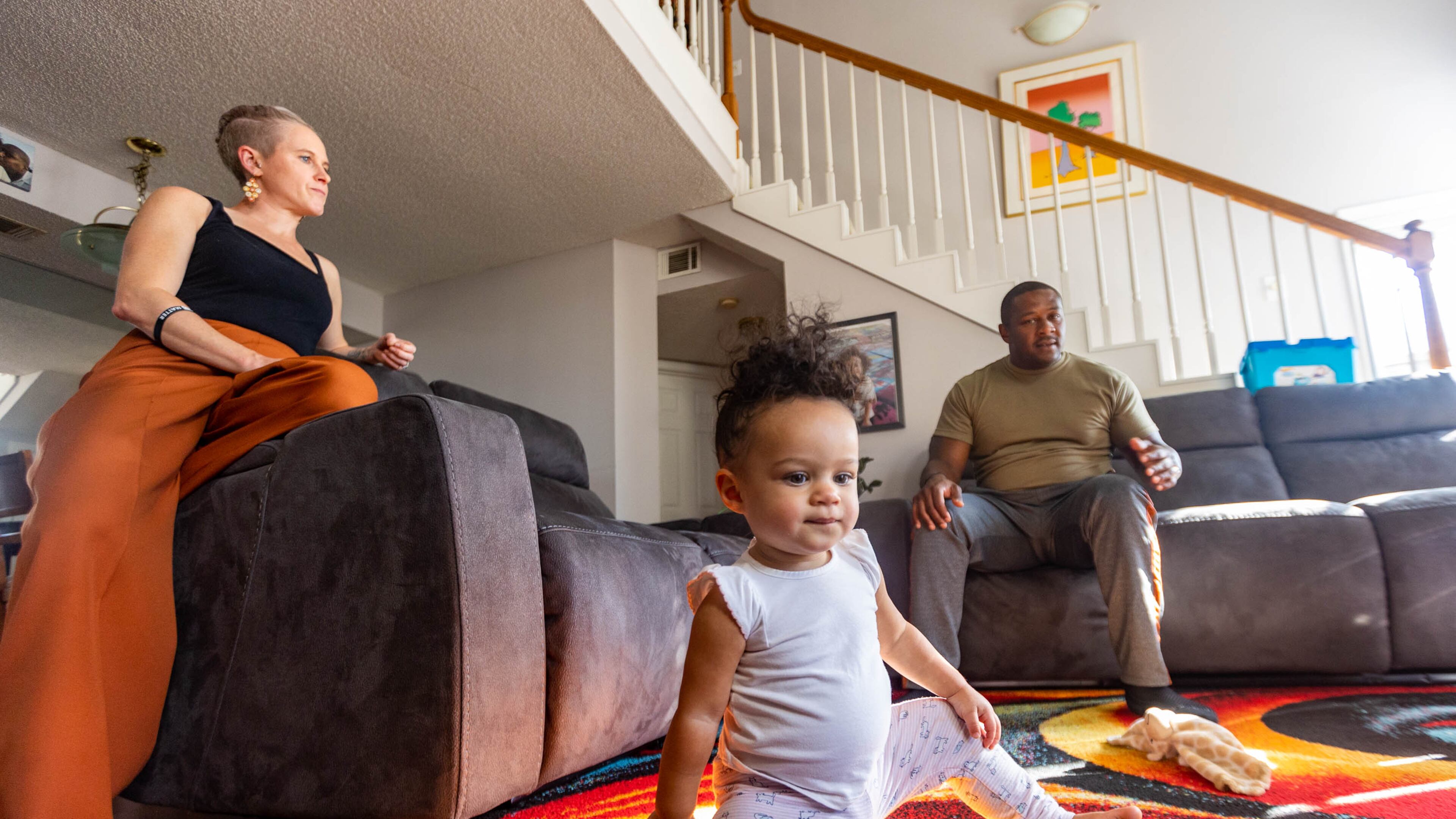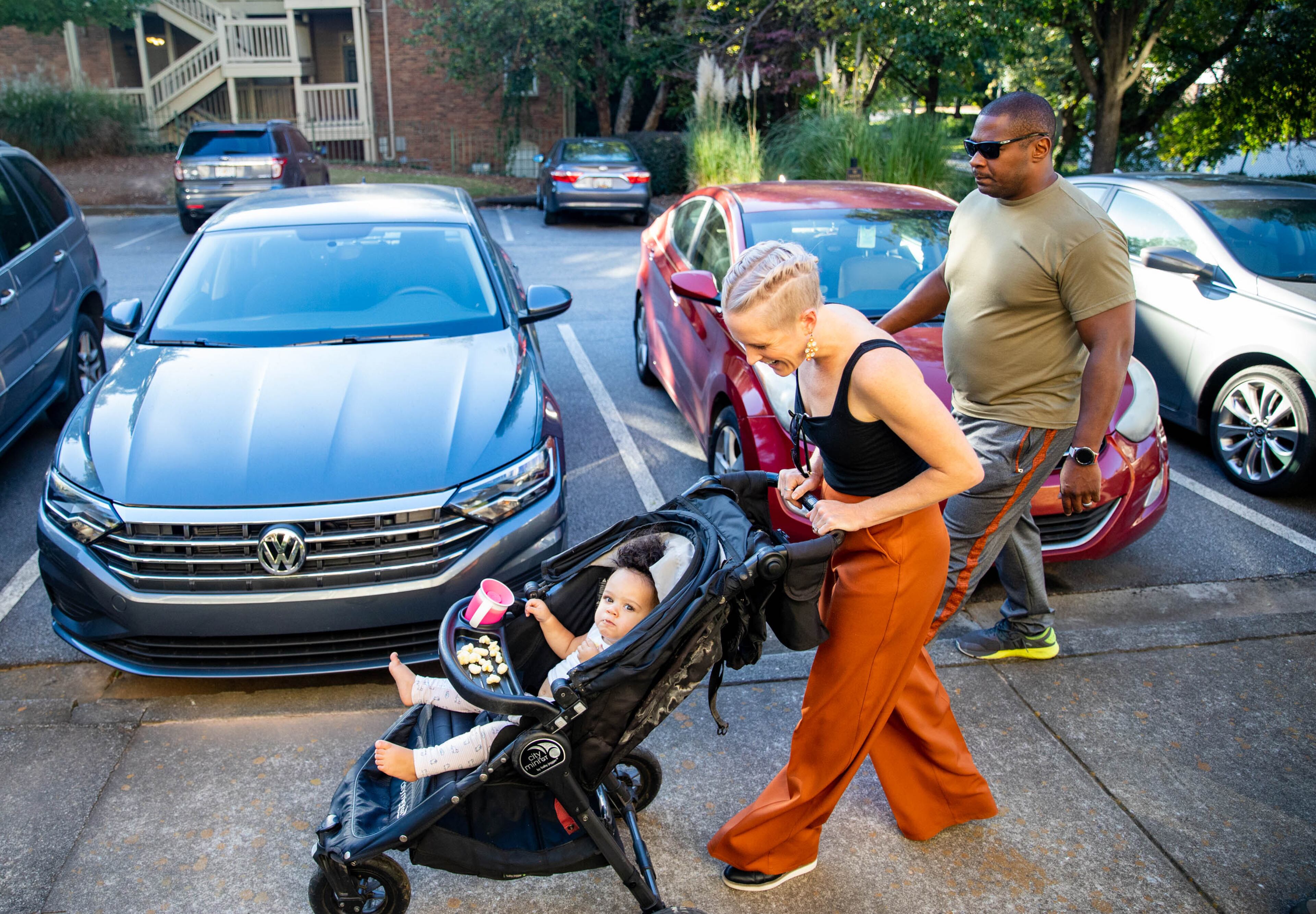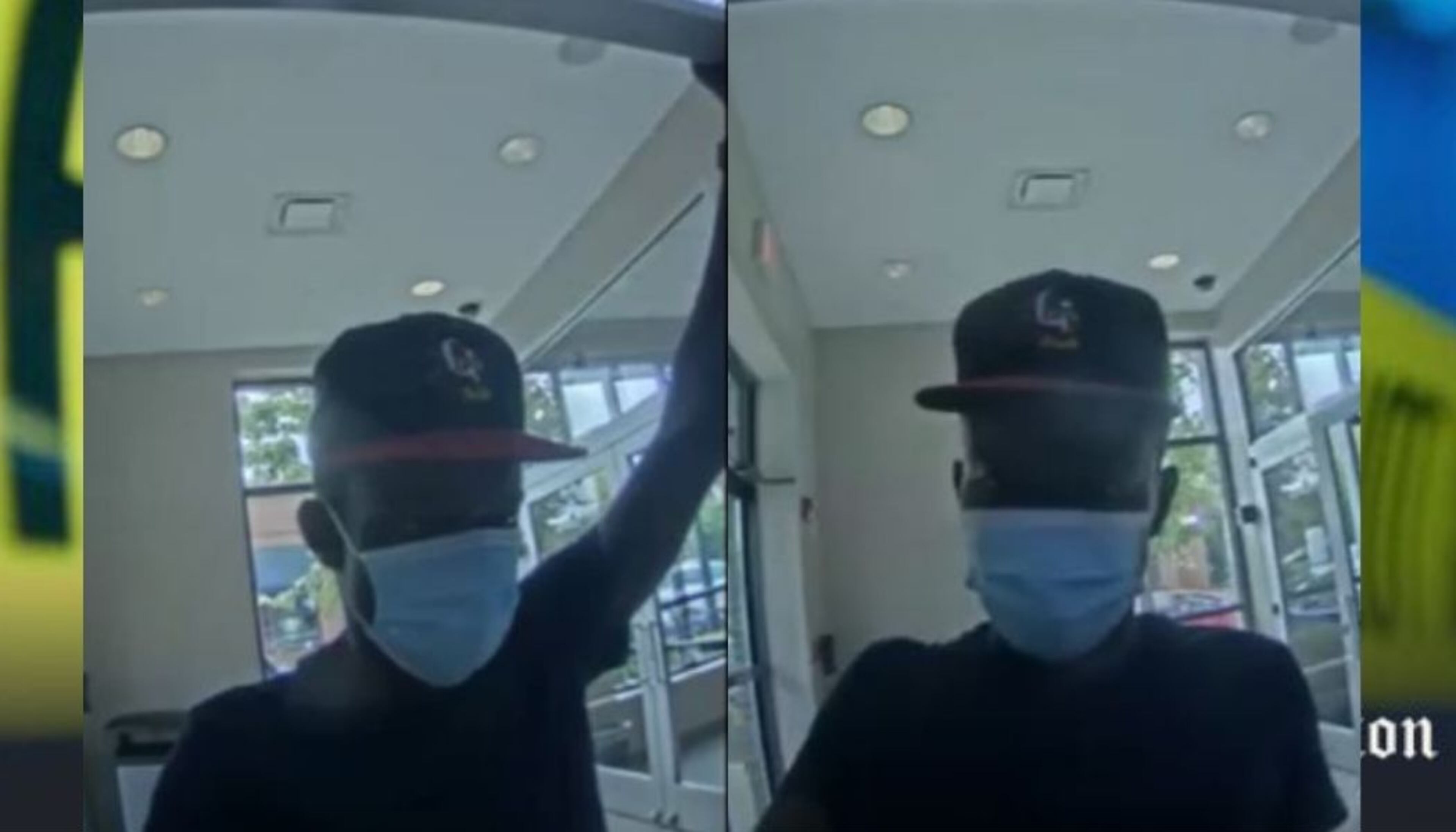For many Atlanta voters, fighting crime is a top priority

From the patio of his condominium in the Old Fourth Ward, Akil Sanders can take in the city’s striking downtown skyline. He is just a short walk from Atlanta’s hugely popular Beltline and acclaimed restaurants. He loves the school his 5-year-old son, Kennedy, attends just around the corner, Kindezi Old Fourth Ward.
But several people have been gunned down near his home, and Sanders occasionally hears gunshots — even automatic gunfire. Thieves frequently break into cars in his gated community. Last summer, peeping Toms started showing up in his neighborhood. A stranger walked into his neighbor’s condominium last spring while she was still inside.
Sanders is among city residents who say Atlanta’s crime surge will play a substantial role in how they vote in this year’s mayoral election. The city is experiencing increases in nearly every category of crime compared to last year, including car thefts, assaults, rapes and murders, Atlanta Police statistics show.
An Atlanta Journal-Constitution poll of 779 registered city voters, released Oct. 21, showed crime by far ranks as the most pressing issue in this year’s election. Just under 70% said Atlanta is on the wrong track dealing with crime, and 61% of respondents said there are areas within a mile of their homes where they would be afraid to walk alone at night.
Most city residents do not have first-hand experience with violent crime. But for this story, AJC reporters spoke to more than a dozen poll respondents — some who have been victims, and others who have not — to understand how crime has impacted their lives and their views of the mayor’s race.
Not all Atlanta residents agree about how to tackle the problem. But many like Sanders see the issue intertwined with joblessness, poverty, desperation amid the coronavirus pandemic and shortages in affordable housing. Targeting those problems, they said, would make an impact.
“Atlanta is growing, growing, growing and I want my property value to continually be worth something and I want my kids to be able to go schools in nice places,” said Sanders, 46, a U.S. Air Force reservist who works in the loan industry. “And I want my friends’ kids to be able to go to schools in nice places and feel safe.”
Sanders is careful about where he and his wife, Stefanie, and their two young children travel through Atlanta, emphasizing he tries not to live in fear but remains constantly aware of his surroundings.
Atlanta police, he said, are shorthanded and take too long to respond. Hiring more officers, equipping them with better “non-lethal tools,” and providing them with additional education could help, he said, along with adding professionals trained to assist people experiencing mental health crises.
“I do appreciate police officers,” he said. “They need to be trained. They need to understand who they are dealing with. They need to have a connection with the community as well as be there to discourage crime as opposed to respond to crime.”

Robbed at gunpoint
Thieves have stolen Isaac White’s firearm twice, once in the driveway of his home in downtown Atlanta — at gunpoint — and once from his car while it was parked by the bistro he owns in Sanders’ Old Fourth Ward neighborhood. His experiences have put him on edge and convinced him carrying a gun is necessary.
“Now it’s kind of like a necessity sometimes just to be careful,” said White, 41, who owns Highland Bistro and lives in East Atlanta.
Meanwhile, people have broken into White’s car so many times that he has programmed his window repairman’s phone number for speed dial. He doesn’t even bother calling the police or filing insurance claims for the damage anymore. He rates crime as one of the top issues Atlanta needs to focus on and said it clouds everything.
Like White, Christian Amaro, 43, of Midtown, has found himself on the wrong end of a gun, though his experience happened just outside Atlanta.
Amaro said he was kidnapped in 2019, when he parked his Lexus at a friend’s gated apartment complex in Chamblee. As he was getting groceries out of his car, he said, a man in a black hoodie stuck a gun up against his belly. The robber ordered him to head to a bank drive-through and withdraw some cash. Then he sped off with Amaro’s car before abandoning it less than a mile away.

Amaro said the hair on the back of his neck stood up when he spotted the kidnapper a few weeks later outside his Midtown apartment. He called the police.
“I was afraid to go to my house because now I know he knows where I live,” Amaro said.
More recently, Amaro said, someone broke into his car while he was shopping at Atlantic Station. The thief shattered his back window but stole only an empty Dolce and Gabbana sunglasses case from inside.
“You almost don’t want to leave to walk around Midtown at night,” he said, “because you either have to be with someone else or be in a group.”

Crime has also hit too close to home for David Lardner, 56, of Edgewood. He returned to his residence this month to find police cars parked on his street. Two robbers had kidnapped a man working on the house next door and robbed him of $1,800. Lardner now fears his spouse may become the victim of a similar crime.
“I worry about my wife, who is sometimes blissfully unaware of her surroundings, and maybe somebody follows her into the driveway one day,” said Lardner, who works for an email marketing company.
He offered some solutions for Atlanta’s battle with crime: More opportunities, better pay and less racial profiling.
“Some of these crimes are not being driven just by greed. It’s desperation,” he said. “They need the money.”

Michael Burgess, 70, was in his garage in Old Fourth Ward several months ago when a stranger rolled up his driveway and began to walk in. Realizing Burgess was in the garage, the stranger quickly drove away. Burgess and his wife installed security cameras after that encounter.
They moved to Atlanta from Douglasville seven years ago so they could walk to grocery stores and restaurants. But the spike in crime has prompted Burgess’ wife to suggest they head back to the suburbs.
“I’m seeing too many cases that affect me and my neighborhood, and it’s disturbing,” said Burgess, a retired small business owner.
He is particularly troubled by street racing and slow response times from Atlanta police.
“I get the impression that when it takes the police over an hour to get to a street racing incident, as it did last night, that’s leadership: Something is wrong at the top,” Burgess said. “I mean, they had blocked off the overpass. How can that happen in the heart of the city?”
Burgess wants a mayor who will do whatever it takes to address crime: Hire more police officers, do a better job of dispatching them and demand more arrests.
“If the next mayor doesn’t address these issues,” Burgess said, “then I could absolutely see us fleeing the area.”
Poverty, affordable housing, education
Ann Westbrook, 80, a retired nurse who lives in North Buckhead, worries about crime, noting thieves broke into a few cars at her condominium complex last year. But she is more focused on affordable housing in Atlanta — particularly for people on fixed incomes — and strongly disagrees with the Buckhead cityhood movement, which is partly driven by rising crime.
“The people who want to secede from Atlanta are nuts. What do they think these people are going to do, come to the city limits and say, ‘Uh oh, we can’t go in there. That’s Buckhead,’?” said Westbrook, who has lived in Atlanta for 32 years. “That is just absolutely ridiculous.”

Pierre Rallu, 44, said his Morningside neighborhood is usually quiet but has experienced an increase in street racing at night. He is somewhat concerned over news reports he has seen about violent crime. But he does not think crime is the most important issue impacting Atlanta today.
City officials, he said, should focus attention on fighting poverty, boosting the public school system and improving access to mental healthcare and mass transportation.
“Crime is becoming an issue, but crime is a symptom,” said Rallu, who has lived in Atlanta for 17 years and has three children in Atlanta public schools. “Therefore, poverty and education are the core issues, so that’s what we need to take care of.”
Brian Wynn, 38, of Westside, agrees crime should not be the main focus because he sees it rooted in affordable housing, homelessness and a lack of opportunities.
“The news is going to keep crime in the headlines — if it bleeds, it leads — but we need to get to the cause of the crime,” said Wynn, a roadside assistance dispatcher. “Not enough money... and expensive housing is causing a lot of distress.”
‘A shining city on a hill’
Suzanne Podzemny has felt relatively safe in the eight years she has lived in Reynoldstown, but that changed recently following the high-profile murders of women and queer people across the city. Two of the victims, Katie Janness and Mariam Abdulrab, were friends of friends, causing Podzemny and others in her circle to become hypervigilant.
“Me and my friends, especially as gay women, are kind of looking out for one another: Walking each other to cars, not staying out late in the dark, going for walks, things that honestly I used to feel comfortable doing, but we’re not doing it anymore,” Podzemny, 35, said. “That’s sad that it feels like we can’t do that, but it’s too risky.”

Yet, housing, economic development and racial inequity are more important issues for her.
“Crime is an issue, but I’m not pleased that we’re continuing to give increases in budget to the police department because I don’t feel like they’re doing their job,” Podzemny said. “Restructuring our criminal justice system, restructuring the way that issues are handled when the city calls the police, to see the police defunded and have that money redirected to some other initiatives — all that is more important to me than crime.”
Podzemny wants to see more resources directed toward alternative policing methods and hopes the new mayor will abandon the plan for a new police and fire training facility approved by the City Council last month. Despite her heightened fears, Podzemny doesn’t intend to leave the city.
“I love Atlanta, and I believe that Atlanta can be a shining city on a hill to show the rest of the country how to solve these issues,” Podzemny said. “We have all the tools and the spirit behind it to do these kinds of things, and I would rather be a part of that than just abandon it.”





